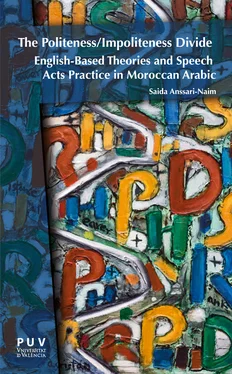The Politeness/Impoliteness Divide
English-Based Theories and Speech Acts Practice in Moroccan Arabic

The Politeness/Impoliteness Divide
English-Based Theories and Speech Acts Practice in Moroccan Arabic
SAIDA ANSSARI-NAIM
U N I V E R S I T A T D E V A L È N C I A
2015

ENGLISH IN THE WORLD SERIES
GENERAL EDITOR
Antonia Sánchez Macarro
Universitat de València, Spain
ADVISORY EDITORIAL BOARD
Professor Enrique Bernárdez
Universidad Complutense de Madrid, Spain
Professor Anne Burns
Macquarie University, Sydney, Australia
Professor Angela Downing
Universidad Complutense de Madrid, Spain
Dr Martin Hewings
University of Birmingham, Great Britain
Professor Ken Hyland
University of London, Great Britain
Professor James Lantolf
Penn State University, Pennsylvania, USA
Professor Michael McCarthy
University of Nottingham, Great Britain
Professor Eija Ventola
University of Helsinki, Findland
© Saida Anssari-Naim © 2015 by the Universitat de València
Design and typeset: Celso Hdez. de la Figuera Cover design by Pere Fuster (Borràs i Talens Assessors SL) Cover illustration: C. H. Sacristán
I S B N : 9 7 8 - 8 4 - 3 7 0 - 9 9 6 3 - 7
To my MumTo the memory of my Dad
CONTENTS
Prologue, by Carlos Hernández and Antonia Sánchez
1. Introduction
2. A sociolinguistic profile of Morocco
3. An overview on English-based theories in cross-cultural communication and politeness
3.1. Cross-cultural communication
3.2. Politeness as a universal variable in cross-cultural communication
4. The politeness/impoliteness divide: thanks/apology, invitation and compliments in Moroccan Arabic.
4.1. Thanks/apology: The phenomenon of extrapolation of “sorry” in Moroccan Arabic
4.1.1. English and Moroccan Arabic parallel speech functions of ‘thanks’ and ‘sorry’
4.1.2. The extrapolation of “smahli”/“sorry” in Moroccan Arabic
4.1.3. “Shukran” + “smahli” and the “added” constraint
4.1.4. The “hearer’s apology”
4.2. Invitations: Imposition/swearing as a politeness strategy
4.2.1. Research on invitations
4.2.2. The cultural contextualization of invitations
4.2.3. Invitation in Moroccan Arabic
4.2.4. Conversational swearing: the pragmatic strategy par-excellence to validate invitations
4.2.5. The sociocultural aspects of invitation in Moroccan Arabic
4.2.6. Invitation refusal
4.3. Compliments and belief constraints in Moroccan Arabic
4.3.1. Research on compliments
4.3.2. Compliments in Moroccan Arabic and the phenomenon of belief in the evil eye
4.3.3. Status, gender and age as social factors in Moroccan Arabic complimenting behaviour
4.3.4. Compliment responses
5. Concluding remarks: Belief as a politeness marker in Moroccan Arabic
6. References
Prologue
The study of the rules governing communicative practice in different languages and cultures is a broad and vibrant area of research. Yet work here has tended to develop through a theoretical framework based on, or heavily influenced by, the English language and the Anglo-Saxon cultural domain. This presence of English in the World has not always been addressed with the necessary critical attitude. If languages impose in some way a particular world view, this will in turn condition and affect the way we deal with how other people communicate, create mental states and propose different views on reality through their language. This is not a new issue in Western culture. Let us recall the usual connotation of the term ‘barbarian’, first used by the ancient Greeks to point to foreign peoples, due to their way of speaking. Consider also the way Latin grammar and the Christian tradition imposed a particular perspective on the description of aboriginal languages and cultures after the ‘discovery’ of America. In more general terms, a Western cultural filter has conditioned the approach to the description of a range of phenomena in different colonial and postcolonial processes. These days the English language has come to serve as the primary means of global communication, yet both the language and the Anglo-Saxon culture associated with it impose certain biases on the view of other linguistic and cultural spaces.
This book seeks to avoid this kind of bias in cross-cultural pragmatics. It contains a proposal for an encounter between English-based theories, developed from a Western cultural perspective, and communicative practices characterising the cultural ethos and language of Morocco. The study will focus on three types of speech acts, relating to the use of thanks and apologies, to the formulation of invitations, and to complimenting behaviour. Together these will provide three perspectives from which to establish a consistent and internally cohesive account of a particular interpretation of the concept of politeness, of the social image involved when performing these speech acts and, finally, of the nature of these communicative acts in the Moroccan cultural context. The book offers, by means of this combination of perspectives on Moroccan communicative practice, an integrated empirical field with which the theoretical models can establish a truly fruitful dialogue. This entails, as a first step, avoiding the assessment of the communicative behaviour of others in terms of deviant or ‘exotic’ interpretations. This study by Saida Anssari-Naim constitutes a valuable contribution to research in cross-cultural pragmatics, but, moreover, should be praised for its unique attempt to transform our perspective on the alien, from the uncritical view of oddity to the insight of a true alterity.
CARLOS HERNÁNDEZ Y ANTONIA SÁNCHEZ
University of Valencia
 1
1 
Introduction
The aim of this book is to illustrate the way in which a theoretical discourse on politeness, based on a specific linguistic-cultural framework, can challenge the practice of politeness in a language and culture with a different tradition. Certainly, this kind of contrast is common in the academic literature dealing with the intercultural dimension of pragmatics. The theoretical discourse on politeness should be understood in close relation to the linguistic and cultural context in which it is historically conceived, i.e. the English language and the associated Anglo-Saxon culture, with all the nuances that this generalization entails. Assigning such a discourse the role of a universal framework brings with it interpretative biases, as well as the danger of overlooking meaningful facets in the description of other cultural and linguistic domains. This interpretative bias is inevitable, considering that the interest and quality of a theoretical discourse lies not simply in the fact that it can be mechanically applied to the description of events, but also in its ability to establish an open dialogue with these. Such an open dialogue always involves negotiating and thus modifying some initial assumptions.
Читать дальше


 1
1 









